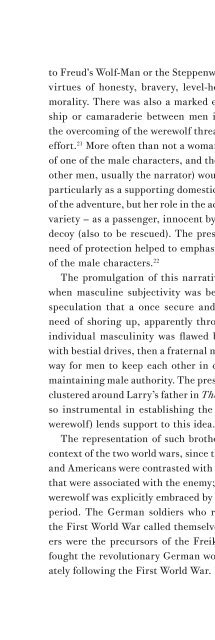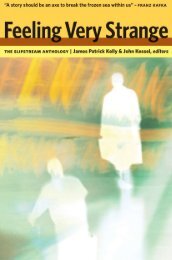The Curse of the Wer.. - Site de Thomas - Free
The Curse of the Wer.. - Site de Thomas - Free
The Curse of the Wer.. - Site de Thomas - Free
You also want an ePaper? Increase the reach of your titles
YUMPU automatically turns print PDFs into web optimized ePapers that Google loves.
THE CALL OF THE WILD<br />
to Freud’s Wolf-Man or <strong>the</strong> Steppenwolf, and mo<strong>de</strong>lled <strong>the</strong> wholesome<br />
virtues <strong>of</strong> honesty, bravery, level-hea<strong>de</strong>dness and strong Christian<br />
morality. <strong>The</strong>re was also a marked emphasis on <strong>the</strong> bonds <strong>of</strong> friendship<br />
or camara<strong>de</strong>rie between men in such narratives; for example,<br />
<strong>the</strong> overcoming <strong>of</strong> <strong>the</strong> werewolf threat was <strong>of</strong>ten portrayed as a group<br />
effort. 21 More <strong>of</strong>ten than not a woman (frequently a daughter or sister<br />
<strong>of</strong> one <strong>of</strong> <strong>the</strong> male characters, and <strong>the</strong> romantic interest for one <strong>of</strong> <strong>the</strong><br />
o<strong>the</strong>r men, usually <strong>the</strong> narrator) would also be inclu<strong>de</strong>d in <strong>the</strong> group,<br />
particularly as a supporting domestic presence in <strong>the</strong> planning stages<br />
<strong>of</strong> <strong>the</strong> adventure, but her role in <strong>the</strong> action was invariably <strong>of</strong> <strong>the</strong> passive<br />
variety — as a passenger, innocent bystan<strong>de</strong>r, victim to be rescued, or<br />
<strong>de</strong>coy (also to be rescued). <strong>The</strong> presence <strong>of</strong> such helpless females in<br />
need <strong>of</strong> protection helped to emphasize <strong>the</strong> strength and competence<br />
<strong>of</strong> <strong>the</strong> male characters. 22<br />
<strong>The</strong> promulgation <strong>of</strong> this narrative tradition at <strong>the</strong> very moment<br />
when masculine subjectivity was being called into question invites<br />
speculation that a once secure and stable masculinity was now in<br />
need <strong>of</strong> shoring up, apparently through fraternal efforts. In<strong>de</strong>ed, if<br />
individual masculinity was flawed by an unconscious programmed<br />
with bestial drives, <strong>the</strong>n a fraternal mo<strong>de</strong>l <strong>of</strong> masculinity was a logical<br />
way for men to keep each o<strong>the</strong>r in check, while still protecting and<br />
maintaining male authority. <strong>The</strong> presence <strong>of</strong> such a fraternal grouping<br />
clustered around Larry’s fa<strong>the</strong>r in <strong>The</strong> Wolf Man (which was o<strong>the</strong>rwise<br />
so instrumental in establishing <strong>the</strong> lone suffering <strong>of</strong> <strong>the</strong> individual<br />
werewolf) lends support to this i<strong>de</strong>a.<br />
<strong>The</strong> representation <strong>of</strong> such bro<strong>the</strong>rhoods is also explicable in <strong>the</strong><br />
context <strong>of</strong> <strong>the</strong> two world wars, since <strong>the</strong> genial alliances <strong>of</strong> <strong>the</strong> English<br />
and Americans were contrasted with <strong>the</strong> more sinister fraternal bonds<br />
that were associated with <strong>the</strong> enemy; not least because imagery <strong>of</strong> <strong>the</strong><br />
werewolf was explicitly embraced by <strong>the</strong> German military during this<br />
period. <strong>The</strong> German soldiers who refused to disband at <strong>the</strong> end <strong>of</strong><br />
<strong>the</strong> First World War called <strong>the</strong>mselves ‘<strong>Wer</strong>ewolves’, and <strong>the</strong>se fighters<br />
were <strong>the</strong> precursors <strong>of</strong> <strong>the</strong> Freikorps, <strong>the</strong> volunteer armies that<br />
fought <strong>the</strong> revolutionary German working class in <strong>the</strong> years immediately<br />
following <strong>the</strong> First World War. Eventually, this group became ‘a<br />
99





